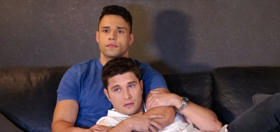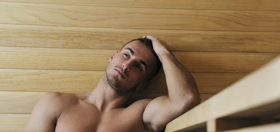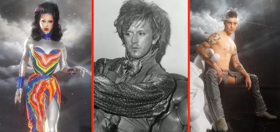
The news that Jerry Falwell Jr. was caught with his pants down and “suspended indefinitely” from the presidency of Liberty university does not surprise me. In fact, it should have happened long ago.
What follows is my experience at his college:
We were sitting, silently shaking, in my car with the lights off in order to cover ourselves in as much darkness as possible.
I was crying.
How about we take this to the next level?
Our newsletter is like a refreshing cocktail (or mocktail) of LGBTQ+ entertainment and pop culture, served up with a side of eye-candy.
She reached for my hand, I flinched, nervously checking to see if anyone was watching. When I felt the softness of my girlfriend’s touch, I began to relax, taking her hand in mine, with only our silhouettes visible to anyone passing by.
This scene of my girlfriend and me—two women scared that we would be caught holding hands and punished for simply being in love—happened not in 1950. Rather, it occurred in 2019 in Lynchburg, Virginia, as we sat together, frightened, on the campus of Liberty University.
Liberty was a place that felt like I had stepped back in time from the day I arrived. Until when I was finally able to leave campus due to the COVID-19 pandemic in 2020, it felt like a scene out of the Lavender Scare in the 1950s, when gay federal employees were outed and then removed from their government positions by McCarthyism.
Related: Jerry Falwell Jr. tweets and quickly deletes photo with his pants wide open
During freshman year, I spent a great deal of time with girls in my dorm, determined to make friends. Our weekly “prayer group” meetings, along with seemingly every meal we shared together, were littered with chatter about boys. Naturally, my friends would ask me if I was interested in any guys, but I always said I was simply too busy adjusting to life at college.
I knew, however, that I was not telling the whole truth. But I wasn’t just withholding the truth from them. I could barely admit to myself what I had been suppressing for years: I had never (ever) been attracted to men.
Ironically, being in a Liberty women’s dorm around beautiful young women all the time, I began to notice—and I mean, really notice—my attraction to the same gender.
I distinctly remember thinking how lucky guys were that they could date women (yes, I realize now that this probably should have been a clue), not even considering the possibility that I was a lesbian. After all, I had been taught over and over (and over) that being gay was a sin. I had heard it growing up, where my family’s limited conversations about sex or attraction were primarily restricted to women needing to cover themselves, so they wouldn’t tempt men to “sin,” or discussions about how the further we went physically before marriage, the less desirable we would be to our future spouse.
The only times I can recall my family talking about the subject specifically were brief comments about how same-sex couples were “ruining the sanctity” of marriage.
During my freshman year, I heard people condemning homosexuality constantly—whether in classes, in conversations with friends, or in our required chapel meetings. Liberty’s curriculum included a handful of required Bible classes, where it was not uncommon for professors to teach about how gay individuals were “living in sin.” I distinctly remember sitting in class when one of my professors commented on how “sad” it was that gay people would “choose to go to hell by being in a relationship.” Liberty would also invite so-called “ex-gay” speakers to preach at our required chapel meetings to encourage gay individuals to “give up their sexual sin.”
I buried my feelings and tried to force myself to conform to Liberty’s standard of “godly” femininity. As it happened, I met this guy Matthew at a small on-campus get-together. When he asked me on a date, I reluctantly agreed, telling him I was excited with a painted-on smile.
But a date with a man just made me more unhappy than ever.
Related: Antigay Liberty University to students: Don’t worry about coronavirus! C’mon back to school!
I felt like I was in a tug-of-war between becoming who I was expected to be and who I really was. Simultaneously, my mental health, with which I had long struggled, began to decline. So, halfway through my freshman year, I took a medical leave of absence. But much to my dismay, Matthew still wanted to keep in touch and maybe even pursue a relationship. I explained I was leaving school, but he insisted we keep up.
Over the summer, I reached out to one of the girls who had been in my dorm, Callie. We hung out a few times that summer, and there was one time we were watching a movie together, and I couldn’t get it out of my mind how beautiful she was. I scooted closer, and she moved closer in turn. I nervously contemplated kissing her.
So, I did.
And to my surprise, she turned around and kissed me back. As we fell asleep nestled together that night, I had a sinking feeling. Does this mean I’m gay? Maybe I didn’t want to go out with a guy, but neither was I ready to be a lesbian.
After that night, Callie and I never spoke of what had happened, and I did my best to forget about our evening together.
Around the same time, Matthew began sending me letters. After a few exchanges, he asked if I would be his girlfriend. While I didn’t feel attracted to him whatsoever, I just naively assumed those feelings would manifest later on, so I agreed.
Matthew was your typical conservative Liberty boy, and when he brought up not wanting to kiss until marriage, I was beyond relieved. And though I was glad we had these boundaries in place, I couldn’t help but think back to that night with Callie.
As Matthew and I continued dating, my mental health issues continued to surface, mainly my struggle with Anorexia. Within no time, I lost my libido, one of the major side effects of Anorexia, and I sank deeper into my depression.
Even though I had an excuse for my lack of attraction, I still felt guilty for not being into Matthew and guilty that, in sharp contrast, I was still drawn to girls and was basically leading Matthew on. I felt as if I had no control, so I ran to my eating disorder for comfort and seeming safety. The more I focused on my Anorexia, the more thoughts about girls faded into the background. My weight plummeted, and I began to have heart issues. My family and friends grew concerned and begged me to get help.
I begrudgingly agreed to visit a doctor. At the end of the appointment, the doctor looked me in the eyes and said, “Tessa, if you don’t get your act together, you won’t be here in a few months.”
Basically, at age 19, I had to decide whether or not I wanted to live. As strange as it sounds to say now, to die would have been easy. But to live? To live would have meant I would have to fight. I would have to reevaluate why I kept falling back into my Anorexia.
I decided to live.

I checked myself into treatment for several months. Being in treatment was healing in several ways. First, I realized how unhappy I was in my relationship, so I broke up with Matthew. Not long after, my physical and mental health began to return. All the while, I prayed relentlessly that God would either turn me straight or that I would come to peace with being lesbian.
But I came to find out that God is not in the business of changing people’s sexual orientations.
That fall, I decided to go back to Liberty. Shortly after beginning the semester, I reconnected with an old friend, Jess. We started meeting up at her apartment every Friday for movie nights. We’d cuddle and fall asleep together. We wrote letters, and sometimes she got me flowers. One night, as she was driving me back to campus, she reached across and grabbed my hand. I instantly felt butterflies in my stomach as I tried to hide my ridiculous grin. That next morning, I called a friend and said, as a 20-year-old, for the first time in my life: “I’m gay.”
Though my relationship with Jess eventually fizzled out, I went on to date a few girls over the next year. But it was growing increasingly difficult to keep who I was to myself, for at this point, I was not out to any of my Liberty friends.
After a subsequent relationship with a girl who I was dating long-distance ended, part of me wanted to open up to my friends on campus, but I feared that my openness would have consequences. I worried about getting punished and fined if Liberty’s leadership found out I had been in a lesbian relationship. For Liberty’s strict policies gave leadership the power to “discipline” students for what they deemed to be un-godly behavior.
I also feared that I would be forced to attend the university’s conversion therapy program—or even that I would be kicked out.
So, I continued to keep my secret to myself, biding my time until I eventually downloaded Tinder one winter break.
I matched with this beautiful butch lesbian, Ash. We texted back and forth until one night she asked to call me. We ended up talking until the early hours of the morning, planning a breakfast date for when we woke up. We met at a quaint downtown coffee shop, and I thought my heart was going to melt when I saw her. Ash and I clicked instantly, and I felt like I had known her forever. By our second date, in line with the stereotype of lesbians and U-Hauls, I had no doubts: I wanted to marry this woman.
When I returned to Liberty after winter break, my roommates could tell something was different. And something was. I was happier, sure. But I also was tired of hiding. I started testing the waters with my queerness—rainbow pins on my backpack, listening to queer artists in my dorm, occasionally dressing in ways that fell outside of the typical feminine-Liberty-girl norm. Around this time, I discovered Liberty’s secret underground LGBTQ+ community, which is a whole story in and of itself.
Of course, at any other university, LGBTQ+ students don’t have to meet up in the meticulously arranged ways that Liberty queers do so as to not get caught, but such was our cross to bear.
A few weeks into the spring 2019 semester, some of the students started planning a demonstration to show support for LGBTQ+ students at Liberty. Jerry Falwell Jr.’s blatant queerphobia had become too much, and his transphobic jokes were unacceptable. The day of the demonstration was what I define as my “coming out” moment. Standing in the middle of Liberty’s campus green, with a pride flag draped over my shoulders like a bullseye on my back, was both terrifying and empowering. My professors saw me. My classmates saw me. And my roommates saw me.
My secret was out.
As is to be expected, the tide of homophobia swept over me. Sure, people had yelled and argued with me at the demonstration, but I expected that. What I didn’t expect were the dozens of messages I would get from acquaintances and classmates. There were the out-of-context Bible verses from those who told me I was going to hell, those who told me I can’t be a lesbian and a Christian, the people who told me I should commit to celibacy, and so on. The more hate I got, however, the more determined I felt to show off my queerness in the gayest ways possible.
Throughout that semester, Ash and I continued dating long-distance. We had been hesitant about her visiting Liberty because we didn’t want people to become suspicious. However, one weekend she decided to come down and surprise me. She took the train down to Lynchburg and showed up at my dorm. We sat on my couch in my room with a few feet between us in order to play the part of being “just friends,” not wanting to arouse the suspicion of my roommates.
But literally minutes after her arrival, my roommate, Rachel, texted me, asking how long Ash would be staying. I texted back saying that since my “friend” had surprised me, we didn’t yet know. Shortly after, my RA, Sarah Marie, approached me. I tried to retain my composure, but inside my stomach sank: Did she know we were more than friends? As it turns out, Rachel had reported us on suspicion of a “homosexual relationship.”
Sarah Marie barged into my room, demanding to know about the nature of our relationship. I glanced at Ash, reading her eyes—I knew she wanted me to say anything that would keep us safe: “We’re just friends.”
“Well, I find that hard to believe,” she said.
Staring Ash in the eyes, she continued: “I’m going to need you to pack up your stuff and leave campus.” My throat tightened.
“But I—we’re just friends! She came down to visit for the weekend.” Sarah Marie immediately dismissed me and declared that she was going to stay put, right there in my room, until Ash left. She planted herself at my desk, glaring at us with a disgusted grimace with her arms smugly folded. Ash and I sat there dumbfounded.
We didn’t know what to do, but I hastily packed an overnight bag, dazed and unsure of where we would go for the evening. We got up, walked out of the room, with Sarah Marie trailing closely behind. We walked quickly to my car and kept the lights off so no one could see us. We sat there for a few minutes in shock.
We decided to text a member of Liberty’s underground LGBTQ+ group who had an apartment off-campus. She told us to come on over and that she’d blow up an air mattress for us. When we arrived, she gave us a tearful hug, knowing that this is what every queer Liberty student fears: being kicked out with nowhere to go. But then, around 2am, my phone rang.
It was my RA.
“Where are you?” I was confused. She had told us to leave—what now? I told her I was staying with a friend for the night.
“How do I know you’re not with your girlfriend? You need to come back. You two cannot be together.”
I knew the Liberty Way (the university’s code of conduct that fines and punishes students for any supposed infractions) was strict, but I didn’t think RAs had the power to summon students to their dorm upon suspecting, without being able to prove, supposed “misconduct.” Nevertheless, I was fearful of the consequences I was likely already facing, so I got in my car and drove back to campus.
I arrived and called my RA. She came out of her room and pulled me into the hall. “You know, you can get counseling for this kind of thing. These kinds of relationships are sinful, but I’d recommend you get therapy for this.” I nodded, turned to go back to my dorm, but she trailed closely behind, proceeding to watch me climb into my bed at 3 am with my girlfriend halfway across town in a stranger’s house.
Not only was it humiliating how my whole dorm had heard about what was going on, but it was infuriating to be apart from my girlfriend who had taken such a long train ride down to visit me. How inhospitable could Liberty be? But what did I expect for attending the world’s largest right-wing evangelical (that is, homophobic) university?
—
This past spring, I finally graduated or, more accurately, escaped from Liberty. No longer will I have to hide who I am. No longer will I face constant snide remarks from my peers for wearing my pride shirts on campus. And no longer will I be gawked or laughed at for the rainbow stickers that cover my laptop.
Instead, I now get to live openly without fear of Liberty’s leadership monitoring how I live my life. I now am able to enjoy the simple act of holding Ash’s hand in public (we’ve been together for over a year!), no longer under the cover of darkness. And I now can live free from a campus culture of shame, guilt, and anxiety. .
But the reality is that for my queer classmates returning to Liberty or for incoming LGBTQ+ students who will begin their studies this fall, they await a steady diet of homophobia. Whether they study on campus—for Jerry Jr. has invited students back and continues to pretend to “social distance” this September—or online, they will continue to be subject to classroom teachings and chapel sermons that devalue, disparage, and defame the queer community. This is not to mention the consistent stream of queer-hatred that spews from students’ mouths—particularly the mouths of student leadership, as was the case with my RA.
But I can only hope that more students—queer or not—begin speaking up and calling out LU for what it is: a homophobic so-called university that actively discriminates against its LGBTQ+ students, taking its inspiration from regressive, bygone eras that should be part of our history books but, unfortunately, are made manifest at places like Liberty University to this day.
Tessa Russell holds a BS in Psychology, magna cum laude, from Liberty University. She currently resides right outside of Washington D.C. where she works as a behavior support clinician assisting individuals with disabilities. In her free time, she enjoys spending time with her girlfriend, Ash, and traveling.



















Vince
No doubt if she was a guy he would’ve gotten the shit beat out of him all the time. I can’t imagine being someone young and thrown into such insanity.
loren_1955
Can so relate. When young I remember watching couples in love and thinking how lucky she was to have such a beautiful man, without realizing the implications. I was 24 when I realized what this was all about. As an irony, I had been applying to Brigham Young University, been accepted, had all the finances lined up. At some level, I couldn’t go to BYU. Come to find out and more than likely I would have been pulled in for BYU’s electroshock therapy experiments on gays at the time. Instead I went to a university nearby. So, so glad Tessa made it out with a level of sanity. Bless you and bless all the other gay boys and girls suffering from silence, hatred, and bigotry.
James
UGLY CHRIXTIAN TRASH GARBAGE. LIBERTY UNIVERISTY IS THE ENTRANCE TO HELL.
Scribe38
@queerty I understand it is hard to make money, especially during the pandemic, but is it too much to ask not to take ads from folks supporting Trump? Why would you run an ad on this post calling Biden a liar? Why would you want to support a homophobic, r@cist, woman hating P.O.S like Drump? I’ve been coming here for years. Before I went to college, before I was a nurse. I won’t keep coming back if you keep this sh!t up.
Scribe38
@queerty I understand it is hard to make money, especially during the pandemic, but is it too much to ask not to take ads from folks supporting Trump? Why would you run an ad on this post calling Biden a liar? Why would you want to support a homophobic, r@cist, woman hating P.O.S like Drump? I’ve been coming here for years. Before I went to college, before I was a nurse. I won’t keep coming back if you keep this up.
Scribe38
I’ve had this account since I was 38. I’m 46 now. Seriously people please correct this.
PQ
All of my ads are for Star Wars and LGBT equality. Don’t blame Queerty for your browsing habits.
rocknstan
For a perspective on these anomalies called “religious colleges,” check out the “Envoy” yearbooks of Pasadena’s now defunct Ambassador College, which finally closed its doors in 1997.
In addition to being a mind-blower (flower arranging was one of the young women’s courses), it buggers the imagination that such an “educational institution” could manage to survive into the 1990s.
Liberty University should close permanently–yesterday.
JessPH
As a self-respecting gay person, I wouldn’t enroll in such bigoted school even if my parents would pay for my entire tuition.
Cam
Would be interesting to sue the RA for harassment. If these holier than thou types think there may be consequences for their bigotry, it’s funny how fast the behavior changes.
MusicBoi74
Sounds like the college I graduated from. I came out during my last semester there, and it was rough. Not everyone responded badly, but many did…such a shame that Christians like to shoot their wounded.